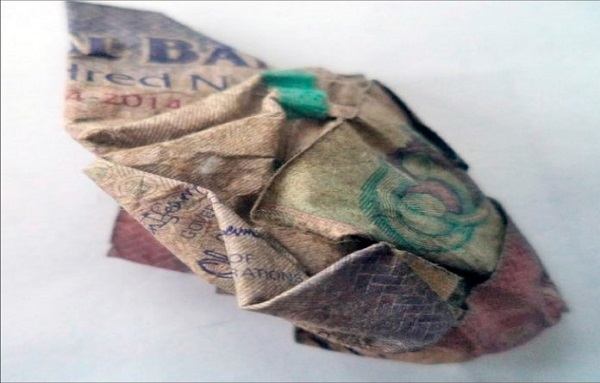Stakeholders in the financial sector have canvassed, among others, the use of alternative payment channels as a way out of getting rid of cases of mutilated Naira notes in the country. Bamidele Ogunwusi, reports on what are needed to eradicate the menace
There is no doubt that the Naira, the nation’s legal tender, is gradually losing its face value as there are growing concerns over the widespread circulation of dirty and mutilated Naira notes across the country.
Investigations revealed that before now, a large number of filthy and tattered notes are the N100 and N50 denominations, but now almost all denominations of the naira currently in circulation have a large percentage of torn or dirty elements.
When customers approach banks to exchange bad Naira notes for new and clean ones, such requests are usually turned down by most commercial banks, saying that new Naira notes are not available.
Most commercial banks are guilty of dispensing bad Naira notes over their counters.
There are reports that the Central Bank of Nigeria (CBN) charges commercial banks that return dirty and mutilated Naira notes in exchange for new ones may have worsened the scarcity of new and clean notes.
A bank official said CBN charges 5 per cent of the total amount of dirty notes tendered by a commercial bank in exchange for new ones.
He said this explains why commercial banks are reluctant to receive dirty notes from customers.
But the CBN’s Acting Director of Corporate Communications, Mr. Isaac Okorafor, said the mutilation of the Naira as perpetrated by members of the public at wedding ceremonies and parties end up damaging the currency.
He, therefore, called on Nigerians to treat the nation’s currency with respect.
“You see it is unfortunate that Nigerians do not take pride in symbols of our national sovereignty. The Naira is a symbol of our National sovereignty.
“We have embarked on sensitisation across the nation and we have gone to 28 states of the federation in the last one year, trying to tell Nigerians how to identify fake Naira notes, counterfeits notes and how to handle the Naira with care.
“We spend a lot of money printing these bank notes. We print a bank note, release a bank note on a Friday, people go to parties they dance on them. They go to churches, they squeeze it and put it in offering and by Monday it is already old and mutilated and we spend hundreds of billions of Naira to print these notes. It is so unfortunate.’’
He said that under no circumstance should the Naira be squeezed or reduced to a piece of paper for writing.
On hawking and sale of newly printed Naira notes, popularly known as “mints’’, Okorafor said that the apex bank was working with the police to stop the illegal practice.
The CBN spokesman also gave reasons why there are so many mutilated Naira notes in circulation, especially the lower denominations.
“The first one is the fact that people handle these notes so badly and so within a short while they don’t get to their lifespan anymore and for the lower denomination notes, they have a higher velocity of circulation.
“What that means is that you use it more often and as you use it in exchange, it gets worn out it gets torn more frequently. So that also creates another problem.
“Another factor is that the banks that have the duty to bring back to us mutilated notes do not do their jobs well.
“Banks are supposed to sort the notes into unfit notes and then when they are bringing the notes back to us, they bring those ones that they have sorted and brought out as unfit and worn out.
“But they don’t do that. And what we do, if they bring it back to us like that, we do the sorting and charge them because it is a job they have failed to do.
“But then, what we have discovered is that banks instead of bringing these notes like that for us to sort them and charge them, they will re-circulate it.’’
Okorafor said that the apex bank would soon release new regulations concerning the role of banks in taking mutilated notes out of circulation.
The CBN spokesman stated that the bank plans to print more money, especially the lower denominations, to ease pressure on the Naira notes already in circulation.
Reactions
“Almost all the N100 notes in circulation are either looking worn and dirty or they are torn and held together with cello tape. It is always difficult getting traders, tricycle operators and bus conductors to accept such notes. The worst part is that the banks don’t accept them when you attempt to make deposits into your account,” said Johnson Awe, a Lagos based computer analyst.
Also speaking on the issue, a trader at Mushin market in Lagos, Mrs. Chidinma Okonkwo, said: “The dirty Naira notes is a big problem for us as many customers refuse to collect dirty naira notes as ‘change’ from us. They will insist that we should change the notes or we should return their money so that they can go to another shop.”
She said she usually does not blame the customers as she could imagine how annoying it can be to pay for an item with clean naira note only to be given ‘change’ in dirty and torn note.
She stated that the situation was getting out of hand as many traders now have a stockpile of dirty notes in their houses that they have not been able to dispose of.
Way out
As a way out, stakeholders believe that Nigerians need to change their attitude towards using the Naira and called for a total change to cashless policy with the use of alternative payment channels where customers pay with credit card alternative
Anor Anyanwu, a former Executive Director, Mainstreet Bank, said though the withdrawal of mutilated notes from circulation is the responsibility of the CBN and that currencies become very bad and are no longer useful the apex bank should withdrawal it and replaces it.
He, however, added that the damaged done to currencies are the responsibilities of Nigerian and Nigerians need to wake up from this abuse of the Naira.
His words: “We must respect the Naira. Even the issue of spraying the Naira must be revisited. We need to wake up as citizens and realise that we have a responsibility to ensure that our currency is respected. The CBN is not the cause of mutilated notes we see around. We need to help the CBN in this regard.
“The cost of printing the currency notes, especially, the lower denominations like N10, N20, N50, N100 and N200 are more expensive than the value of the currencies. So, the CBN is frustrated and we must help CBN by preserving the currencies. We can’t be destroying the currency and we hold CBN responsible”.
Anyanwu noted that most Nigerians should begin to take advantage of the available alternative payment channels to reduce cases of mutilated currencies in circulation, stressing that though a lot of transactions are now done through alternative channels.
“Transactions using mobile channels are unbelievable but there is a need to note that some transactions are only going to be done with cash. The fares you pay to commercial buses, okada riders and others are done with cash. If you go to the market to buy things, the woman who don’t have PoS and whose business cannot afford a PoS will still take cash from you”, he added.
To encourage the use of alternative channels, Kunle Johnson, a Lagos-based financial analysts and chartered accountant, said the CBN and the banks should give incentives that will encourage people to use these channels.
His words: “Charges by banks should be reduced to encourage use of alternative channels. If there are incentives, people will prefer using these channels than carry cash. The cashless policy of the CBN should be looked into to give room to transactions in lower currency notes”.













